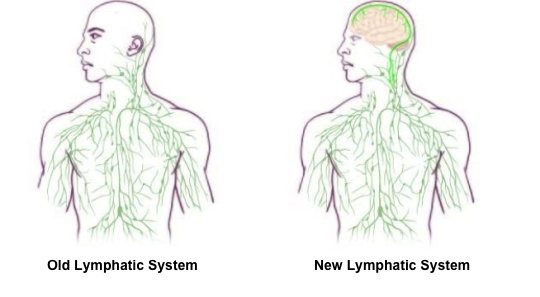Alphabiotic participants frequently tell me their immune system is stronger – they report fewer colds and flu as well as faster recoveries, more resiliency, etc.
We attributed this to the impact substantive stress relief should have on endocrine activity, hormone levels and body chemistry, not to mention more esoteric effects on one’s state of consciousness and ‘energy body’ (e.g. one’s aura and quality/quantity of chi). A new and amazing discovery that the lymph system extends all the way into the brain creates a mechanical connection never before documented.
The brain itself is protected by the immune system in a manner previously and entirely unknown…
Natural Awakenings magazine quotes Sciencedaily.com:
“In a stunning discovery that overturns decades of textbook teaching, researchers have determined that the brain is directly connected to the immune system by vessels previously thought not to exist. ‘That such vessels could have escaped detection when the lymphatic system has been so thoroughly mapped throughout the body is surprising on its own…
“…the brain is like every other tissue connected to the peripheral immune system through meningeal lymphatic vessels,’ said Jonathan Kipnis, PhD, professor in the UVA Department of Neuroscience… ‘It changes entirely the way we perceive the neuro-immune interaction. We always perceived it before as something esoteric that can’t be studied.’
“Kevin Lee, PhD, chairman of the UVA Department of Neuroscience, described his reaction to the discovery by Kipnis’ lab: ‘The first time these guys showed me the basic result, I just said one sentence: ‘They’ll have to change the textbooks. There has never been a lymphatic system for the central nervous system, and it was very clear from that first singular observation — and they’ve done many studies since then to bolster the finding — that it will fundamentally change the way people look at the central nervous system’s relationship with the immune system.’
“Even Kipnis was skeptical initially. ‘I really did not believe there are structures in the body that we are not aware of. I thought the body was mapped,’ he said. ‘I thought that these discoveries ended somewhere around the middle of the last century. But apparently they have not.’
“As to how the brain’s lymphatic vessels managed to escape notice all this time, Kipnis described them as ‘very well hidden’ and noted that they follow a major blood vessel down into the sinuses, an area difficult to image. ‘It’s so close to the blood vessel, you just miss it,’ he said. ‘If you don’t know what you’re after, you just miss it. Live imaging of these vessels was crucial to demonstrate their function…’ Kipnis noted.
“The unexpected presence of the lymphatic vessels raises a tremendous number of questions that now need answers, both about the workings of the brain and the diseases that plague it. For example, take Alzheimer’s disease. ‘In Alzheimer’s, there are accumulations of big protein chunks in the brain,’ Kipnis said. ‘We think they may be accumulating in the brain because they’re not being efficiently removed by these vessels.’ He noted that the vessels look different with age, so the role they play in aging is another avenue to explore. And there’s an enormous array of other neurological diseases, from autism to multiple sclerosis, that must be reconsidered in light of the presence of something science insisted did not exist.”
Excerpted from Sciencedaily.com
Credit: University of Virginia Health System
